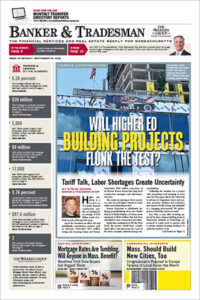The state’s comprehensive permit laws (40B, 40R, 40S and the like) that developers use to bypass local zoning and create more multifamily house are, in a word, awesome.
That’s not something you read or hear very often.
The earliest of the laws was created in 1969 and as a whole they provide incentives for developers to build affordable housing that would otherwise make those projects unprofitable. To date, the laws have been used to build more than 68,500 units of affordable housing throughout the commonwealth. Without these laws, it’s unlikely that most of those units would ever have been built.
The commonwealth of Massachusetts requires that every municipality have at least 10 percent of its housing affordable to households making less than the area median income. Approximately 90 percent of cities and towns are below that threshold and thus susceptible to developers buying property and bypassing local zoning to build dense and profitable developments they otherwise couldn’t get permitted under local zoning restrictions.
Real estate economists and urban planners say that in order to be economically healthy, every community needs an adequate supply of affordable housing. The lack of sufficient affordable housing in Massachusetts is routinely cited as the biggest limiting factor in the Bay State’s economic growth.
We need affordable housing in every town and city. Too many of our wealthier suburbs have been skating along, permitting single-family homes on too-big lots for too long. There’s nothing inherently wrong with that, but in ignoring the need for affordable housing (remember, it’s the law), these communities leave themselves open to developers putting in dense projects where they may not be the best use of the land – and are overlooking areas where it developments could be better deployed.
Builders are in business to make money. Without comprehensive permit laws, affordable housing is expensive and difficult to build – and it’s not profitable. That’s why builders weren’t building affordable housing and it’s why the laws were created.
Most Massachusetts residents will say they support affordable housing in the abstract. However, in most communities, the moment a developer submits a proposal for a 40B project to the city or town, residents flood town meetings to oppose them.
They complain about increases in the school population, increases in traffic, that the projects are “not right for the neighborhood.” They hurl every conceivable complaint at these projects in the hope that something will stick.
This is short-sighted and in many ways, against their own self-interest.
Developers are not sneaking into towns and cramming affordable housing developments in where they don’t belong. They are using the law to help cities and towns get the affordable housing they need and, yes, making a lot of money in the process.
Think of the suite of comprehensive permit laws like nasty-tasting cough medicine. You might not like them, but you need them, and they’re the only thing that works.





